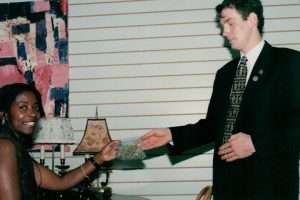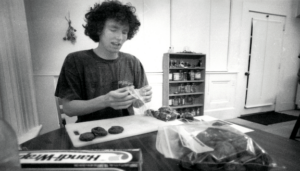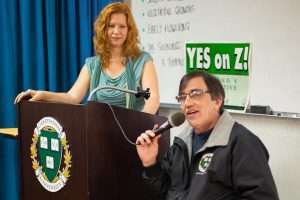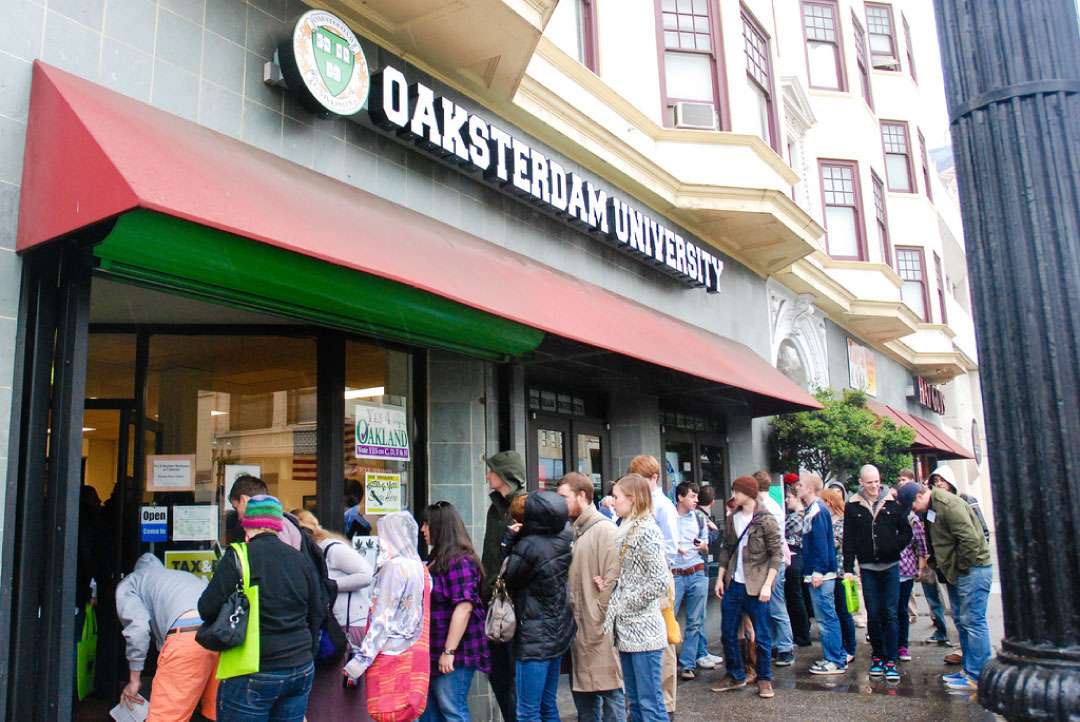Our mission and the story of how we got here began in the 1990s. Oakland, California, was a very different place from what it is today; the 1989 Loma Prieta earthquake that rocked the Bay Area had left countless vacant buildings in its wake, unfit for occupancy. Few people came downtown, and never after dark, but the rent was cheap, and if you can imagine, parking was readily available. Many of the world’s leading cannabis advocates were based in the San Francisco Bay Area, where the origins of the medical cannabis movement began. They set the stage for the City of Oakland to become the epicenter of the burgeoning cannabis industry in a cannabis-friendly area now known as the “Oaksterdam District,” a key chapter in cannabis history.
The OCBC and the Old Oaksterdam District
At 14, Jeff Jones watched his father die painfully of kidney cancer. After researching cannabis as medicine and attempting to grow his first plant surreptitiously in the family basement, he moved to California to work with the Cannabis Action Network (CAN), where other influential cannabis history advocates and industry leaders got their start. CAN worked on Prop 215 with many other pioneers, including Dennis Peron, the father of medical marijuana and the first to start a cannabis club.

A core cannabis history moment from 1998, when the Oakland Cannabis Buyer’s Cooperative was briefly allowed to legally provide cannabis to patients by the 9th Circuit Court of Appeals before the US Supreme Court reversed the decision. In this picture, Jeff Jones is shown providing the first legal bag of cannabis to multiple sclerosis patient Yvonne Westbrook after the appeal.
Jeff began providing medical cannabis to patients in 1995—a year before California became the first state to legalize medical use. Jeff initially established the Oakland Cannabis Buyers Cooperative (OCBC) as a bicycle service until he opened doors to the first government-approved dispensary in downtown Oakland, sanctioned by the city.
FBI undercover investigations led to a federal raid and injunction that seized Jeff’s office and locked them out for weeks. Jeff’s case went before the Ninth Circuit Court of Appeals, and won, temporarily allowing OCBC to distribute medical cannabis again. The case was escalated to the Supreme Court of the United States of America (SCOTUS). The justices overturned the lower court’s decision.
Blue Sky Cafe’ and the Oaksterdam District
The name Oaksterdam is a blend of Oakland and Amsterdam, the first two cities to permit the distribution of cannabis openly, and eventually came to describe the area of the city where uptown meets downtown, where more than a dozen medical cannabis dispensaries sprung up over a decade ago. The name for the neighborhood stuck.
Longtime cannabis activist Richard Lee came to Oakland after co-founding Legal Marijuana in Houston, Texas, one of the first hemp products retail outlets in the state. After an on-the-job fall from structural scaffolding while setting up lighting for a rock concert, the motorcycle-riding daredevil found himself permanently bound to a wheelchair with debilitating muscle spasms. After using cannabis and discovering it helped better than the pain prescriptions, Richard set out to convince his right-wing Christian conservative parents, Bob and Ann Lee, that marijuana was not the weed of the devil and that it was, in fact, helping him. Like any good parent who loves their son, the Lees listened and came to support Richard’s mission, realizing it was in line with their belief in the right to life and federalism, through R.A.M.P., Republicans Against Marijuana Prohibition.
Richard began growing in Houston and started to supply the OCBC after visiting in the summer of 1995, which was the 50th anniversary and world conference of the United Nations with new Human Rights Resolution. Richard decided to start supplying OCBC directly through the mail, which alarmed Jeff, who convinced Richard to move to California.

Jeff Jones preparing edibles for patients, circa 1995.
Once in Oakland, Richard began the Hemp Research Company in 1997 and opened the Bulldog Coffeeshop in 1999. In 2003, he opened Coffeeshop SR-71, a pivotal moment in cannabis history, and founded the Oakland Civil Liberties Alliance. This was the PAC that passed Oakland’s Measure Z, making cannabis law enforcement the lowest police policy and paving the way for private cannabis distribution and consumption spaces in Oakland.
Richard wanted to change the negative stereotypes attached to cannabis, a focus that he believed was crucial for legalization. In August 2007, with the concept of creating a cannabis university with a mission to “legitimize the business and work to change the law to make cannabis legal,” Richard placed an ad in the East Bay Express that read: “Cannabis Industry, Now Hiring.” In the first week, he received over 200 calls inquiring about his bold ad, and Oaksterdam University was born.
Of those first 200 callers, 20 became the first class of students of Oaksterdam University and key players in cannabis history. Students were taught horticulture, cooking, extracts, legal issues, and successful law enforcement encounters—plus politics and history—from the top minds in the movement and industry. Little did Richard know how much Oaksterdam University would transform downtown Oakland and make it ground zero of the international cannabis reform movement.
Dale Sky & Oaksterdam University
In 2007, Dale Sky Clare left a secure, six-year upper-management position working for the second-largest shoe manufacturer in the world to work as a business manager for a medical practice that issued cannabis recommendations. Dale connected with Dale Gieringer, PhD, longtime director of the California NORML to better understand the climate for doctors and patients. Gieringer recommended Dale talk to someone who was practiced at educating people on what the patient needs and what the doctor is allowed to provide and introduced her to Jeff Jones, formerly of OCBC, who had recently opened a Patient ID center office in Los Angeles.
After Oaksterdam’s inaugural class, demand for classes grew quickly. National media coverage put Oaksterdam in the spotlight, and the university grew faster than anyone imagined. Dale joined Oaksterdam’s staff as a science instructor in February 2008 and was determined to add satellite schools around the country. The LA location was the first site for a satellite campus followed by Ann Arbor, Michigan, which had passed a new law similar to California’s that allowed cultivation by patients and their caregivers. By early 2009 Dale had become a Co-Chancellor of the OU Los Angeles campus together with Jeff Jones. Michigan was so successful that Dale traveled to open a North Bay campus in Sebastopol, California that same year.
Oaksterdam University Gets Political
In the summer of 2009, Richard Lee implemented an extensive open-source process to elicit input from the base on a statewide legalization campaign, with Jeff Jones as the ballot initiative’s co-signer. The Control, Tax, and Regulate Cannabis Act (Proposition 19) would have allowed adults 21 years old and older to possess and cultivate a small amount of cannabis and gave local jurisdictions the option to tax and regulate sales and commercial cultivation.
By November 2009, only two years after the college’s inception, the Oakland campus was leased and under renovation at 1600 Broadway to meet student demand. The new 30,000-square-foot school – the first in cannabis history – included multiple classrooms, a vast auditorium, the first hands-on grow lab, a theater, and a 10,000-square-foot basement nursery full of baby plants. Class sizes and frequency grew and accommodated up to 120 students per class. Oaksterdam welcomed thousands of students from around the world and all the businesses in the neighborhood were becoming quite successful.

During the Prop 19 campaign, Jeff Jones married Dale Sky at the Rotunda Building, asking friends and family to donate to the campaign in lieu of wedding gifts. They had their first son, Jackson Wolf, that December. Richard spent over $1.3 million of his own money—including his profits from OU—to get Proposition 19 on the ballot; it failed to meet the 50% voter threshold to pass.
On April 2, 2012, another pivital moment in cannabis history, Oaksterdam University was raided by agents of the Internal Revenue Service, assisted by US Marshals, the ATF, and the DEA. They raided Oaksterdam University, Gift Shop, Museum, Blue Sky Dispensary, the home of a friend, and the apartment of Richard Lee, forcibly retiring him from his businesses. The federal raid left the college in shambles; damage amounted to tens of thousands of dollars. Doors were broken, computers snatched, records removed, and lab cannabis plants were cut down or removed. Unfortunately, because federal agents had not coordinated the raid with the Oakland Police Department, the worst school shooting in Oakland’s history took place that same day at Oikos University, with limited response from OPD. The City Council protested the raid and OPD was furious for the lack of coordination or warning from the federal government.
Though no legal charges were filed against Oaksterdam or its operators, fears of legal action kept students from completing their courses and enrollment plummeted. Richard stepped down as the Oaksterdam University President and assigned Dale Sky Jones, who at the time was OU’s Executive Chancellor to oversee all curriculum and satellite campuses, with the responsibility of rescuing the school and the museum as well as all corporate and operational responsibilities.
Oaksterdam State of Mind
Under Dale’s leadership, Oaksterdam migrated fully online and today provides education to government-backed equity technical assistance programs and individual learners worldwide. We are proud of the over 110,000 graduates from more than 116 countries who have gone on to become entrepreneurs, business leaders, and cannabis advocates. Nearly 20 years of Oaksterdam graduates have gone on to lead their local industries, and we are proud to continue to lead the movement. Click below to learn more about Oaksterdam University’s current programs or sign up for a course.
